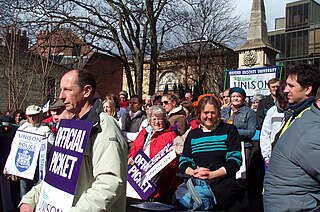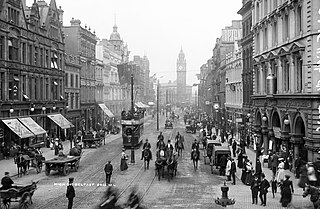Related Research Articles

The February 1974 United Kingdom general election was held on Thursday, 28 February 1974. The Labour Party, led by Leader of the Opposition and former Prime Minister Harold Wilson, gained 14 seats, but was seventeen short of an overall majority. The Conservative Party, led by incumbent Prime Minister Edward Heath, lost 28 seats; but achieved a higher share of the vote than Labour. This resulted in a hung parliament, the first since 1929. Heath resigned when he refused to a key term of a possible coalition, and Wilson became Prime Minister for a second time, his first under a minority government. Because Labour was unable to form a majority coalition with another party, Wilson called another early election in September, which was held in October and resulted in a Labour majority. This was also the first general election to be held with the United Kingdom as a member state of the European Communities (EC)—widely known as the "Common Market".

United Kingdom labour law regulates the relations between workers, employers and trade unions. People at work in the UK can rely upon a minimum charter of employment rights, which are found in Acts of Parliament, Regulations, common law and equity. This includes the right to a minimum wage of £9.50 for over-23-year-olds from April 2022 under the National Minimum Wage Act 1998. The Working Time Regulations 1998 give the right to 28 days paid holidays, breaks from work, and attempt to limit long working hours. The Employment Rights Act 1996 gives the right to leave for child care, and the right to request flexible working patterns. The Pensions Act 2008 gives the right to be automatically enrolled in a basic occupational pension, whose funds must be protected according to the Pensions Act 1995.

Referendums in the United Kingdom are occasionally held at a national, regional or local level. Historically, national referendums are rare due to the ancient principle of parliamentary sovereignty: there is no constitutional requirement to hold a national referendum for any purpose or on any issue; but the UK Parliament is free to legislate though a Act of Parliament for a national plebiscite to be held on any question at any time but cannot be constitutionally binding on either the Government or Parliament, although they usually have a persuasive political effect.
Amalgamated Society of Railway Servants v Osborne [1910] AC 87 is a UK labour law case, which ruled that members of trade unions would now have to "contract in" if they wanted a portion of their salary to go to a trade union, unlike the previous system of "contracting out", in which the portion of salary was taken unless the individual explicitly stated otherwise.

Trade unions in the United Kingdom were first decriminalised under the recommendation of a Royal commission in 1867, which agreed that the establishment of the organisations was to the advantage of both employers and employees. Legalised in 1871, the Trade Union Movement sought to reform socio-economic conditions for working men in British industries, and the trade unions' search for this led to the creation of a Labour Representation Committee which effectively formed the basis for today's Labour Party, which still has extensive links with the Trade Union Movement in Britain. Margaret Thatcher's governments weakened the powers of the unions in the 1980s, in particular by making it more difficult to strike legally, and some within the British trades union movement criticised Tony Blair's Labour government for not reversing some of Thatcher's changes. Most British unions are members of the TUC, the Trades Union Congress, or where appropriate, the Scottish Trades Union Congress or the Irish Congress of Trade Unions, which are the country's principal national trade union centres.
The Industrial Relations Act 1971 (c.72) was an Act of the Parliament of the United Kingdom, since repealed. It was based on proposals outlined in the governing Conservative Party's manifesto for the 1970 general election. The goal was to stabilize industrial relations by forcing concentration of bargaining power and responsibility in the formal union leadership, using the courts. The act was intensely opposed by unions, and helped undermine the government of Edward Heath. It was repealed by the Trade Union and Labour Relations Act 1974 when the Labour Party returned to government.
The Trade Union and Labour Relations (Consolidation) Act 1992 is a UK Act of Parliament which regulates United Kingdom labour law. The Act applies in full in England and Wales and in Scotland, and partially in Northern Ireland.
The Trade Disputes Act 1906 was an Act of the Parliament of the United Kingdom passed under the Liberal government of Sir Henry Campbell-Bannerman. The Act declared that unions could not be sued for damages incurred during a strike.

Quinn v Leathem [1901] UKHL 2, is a case on economic tort and is an important case historically for British labour law. It concerns the tort of "conspiracy to injure". The case was a significant departure from previous practices, and was reversed by the Trade Disputes Act 1906. However, the issue of secondary action was later restricted from the Employment Act 1980, and now the Trade Union and Labour Relations (Consolidation) Act 1992. The case was heavily controversial at the time, and generated a large amount of academic discussion, notably by Wesley Newcomb Hohfeld, which continued long after it was overturned.

Boulting v Association of Cinematograph, Television and Allied Technicians [1963] 2 QB 606 is a UK labour law and UK company law case from the Court of Appeal. It covers the issue of what it means to act in the best interests of the company, relevant under section 172 of the Companies Act 2006.

The Constitution of the United Kingdom or British constitution comprises the written and unwritten arrangements that establish the United Kingdom of Great Britain and Northern Ireland as a political body. Unlike in most countries, no attempt has been made to codify such arrangements into a single document. Thus, it is known as an uncodified constitution. This enables the constitution to be easily changed as no provisions are formally entrenched. However, the Supreme Court of the United Kingdom recognises that there are constitutional principles, including parliamentary sovereignty, the rule of law, democracy and upholding international law.

Pender v Lushington (1877) 6 Ch D 70 is a leading case in UK company law, which confirms that a company member's right to vote may not be interfered with, because it is a right of property. Furthermore, any interference leads to a personal right of a member to sue in his own name to enforce his right. As Lord Jessel MR put it, a member:
has a right to say, "Whether I vote in the majority or minority, you shall record my vote, as that is a right of property belonging to my interest in this company, and if you refuse to record my vote I will institute legal proceedings against you to compel you."

Secretary of State for Employment v Associated Society of Locomotive Engineers and Firemen [1972] ICR 19 is a UK labour law case concerning the contract of employment. It held that there is an implied term of good faith in an employment contract, and if the employer withdraws this, it is a breach of contract. The consequence was that in a strike, employees merely "working to rule" needed not to be paid, because they had only partly performed their obligations.
South African labour law regulates the relationship between employers, employees and trade unions in the Republic of South Africa.

Unite the Union, commonly known as Unite, is a British and Irish trade union which was formed on 1 May 2007 by the merger of Amicus and the Transport and General Workers' Union (TGWU). Unite is the second largest trade union in the UK, with over 1.2 million members across construction, manufacturing, transport, logistics, and other sectors. The general secretary of Unite is Sharon Graham, who was elected on 25 August 2021 with 46,696 votes on a turnout of 124,127, with her term beginning on 26 August 2021.
National Union of Rail, Maritime and Transport Workers v United Kingdom [2014] ECHR 366 is a UK labour law case, concerning collective action and the right to take secondary action under ECHR article 11. It held that UK restrictions cannot be questioned on human rights grounds.
RMT v Serco Ltd and ASLEF v London & Birmingham Railway [2011] EWCA Civ 226 is a joined UK labour law case, concerning the right to strike under the Trade Union and Labour Relations (Consolidation) Act 1992.
The European Union Referendum Act 2015 is an Act of the Parliament of the United Kingdom that made legal provision for a consultative referendum to be held in the United Kingdom and Gibraltar, on whether it should remain a member state of the European Union or leave the bloc altogether. The Bill was introduced to the House of Commons by Philip Hammond, Foreign Secretary on 28 May 2015. Two weeks later, the second reading of the Bill was supported by MPs from all parties except the SNP; the Bill subsequently passed on its third reading in the Commons on 7 September 2015. It was approved by the House of Lords on 14 December 2015, and given Royal Assent on 17 December 2015. The Act came partly into force on the same day and came into full legal force on 1 February 2016.

Hodgson v National and Local Government Officers' Association [1972] 1 WLR 130 is a UK labour law case, concerning the governance of trade unions in the United Kingdom.

Morgan v Simpson [1975] QB 151 is a UK constitutional law case, concerning the right to vote and the integrity of votes and elections in the United Kingdom.